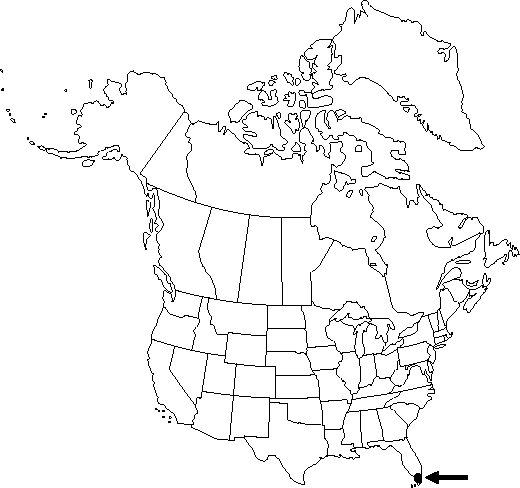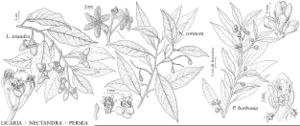Difference between revisions of "Licaria triandra"
Recueil Trav. Bot. Néerl. 34: 588. 1937.
Common names: Gulf triandra
Illustrated
Basionym: Laurus triandra Swartz Prodr., 65. 1788
Synonyms: Acrodiclidium triandrum (Swartz) Lundell Misanteca triandra (Swartz) Mez
Treatment appears in FNA Volume 3.
FNA>Volume Importer |
imported>Volume Importer |
||
| (7 intermediate revisions by 2 users not shown) | |||
| Line 10: | Line 10: | ||
|special_status={{Treatment/ID/Special_status | |special_status={{Treatment/ID/Special_status | ||
|code=F | |code=F | ||
| − | |label= | + | |label=Illustrated |
}} | }} | ||
| − | |basionyms={{Treatment/ID/ | + | |basionyms={{Treatment/ID/Basionym |
|name=Laurus triandra | |name=Laurus triandra | ||
|authority=Swartz | |authority=Swartz | ||
| + | |rank=species | ||
| + | |publication_title=Prodr., | ||
| + | |publication_place=65. 1788 | ||
}} | }} | ||
|synonyms={{Treatment/ID/Synonym | |synonyms={{Treatment/ID/Synonym | ||
|name=Acrodiclidium triandrum | |name=Acrodiclidium triandrum | ||
|authority=(Swartz) Lundell | |authority=(Swartz) Lundell | ||
| − | }}{{Treatment/ID/Synonym | + | |rank=species |
| + | }} {{Treatment/ID/Synonym | ||
|name=Misanteca triandra | |name=Misanteca triandra | ||
|authority=(Swartz) Mez | |authority=(Swartz) Mez | ||
| + | |rank=species | ||
}} | }} | ||
|hierarchy=Lauraceae;Licaria;Licaria triandra | |hierarchy=Lauraceae;Licaria;Licaria triandra | ||
| Line 30: | Line 35: | ||
}}<!-- | }}<!-- | ||
| − | --><span class="statement" id="st- | + | --><span class="statement" id="st-undefined" data-properties=""><b>Trees,</b> 8-12 m. <b>Leaf</b> blade narrowly elliptic, 5-15 × 2-7 cm, base acute, apex slightly acuminate; surfaces glabrous when mature. <b>Inflorescences</b> to 10 cm, flowers often densely grouped at tips of inflorescence branchlets. <b>Flowers</b> 2-3 mm; tepals glabrous; stamens longer than tepals; pistil glabrous. <b>Drupe</b> to 3 cm.</span><!-- |
-->{{Treatment/Body | -->{{Treatment/Body | ||
| Line 36: | Line 41: | ||
|habitat=In hammocks | |habitat=In hammocks | ||
|elevation=0-10 m | |elevation=0-10 m | ||
| − | |distribution=Fla.;West Indies;Central America;South America (Andes) | + | |distribution=Fla.;West Indies;Central America;South America (Andes). |
|tables= | |tables= | ||
|references= | |references= | ||
| Line 45: | Line 50: | ||
-->{{#Taxon: | -->{{#Taxon: | ||
name=Licaria triandra | name=Licaria triandra | ||
| − | |||
|authority=(Swartz) Kostermans | |authority=(Swartz) Kostermans | ||
|rank=species | |rank=species | ||
| Line 55: | Line 59: | ||
|habitat=In hammocks | |habitat=In hammocks | ||
|elevation=0-10 m | |elevation=0-10 m | ||
| − | |distribution=Fla.;West Indies;Central America;South America (Andes) | + | |distribution=Fla.;West Indies;Central America;South America (Andes). |
|reference=None | |reference=None | ||
|publication title=Recueil Trav. Bot. Néerl. | |publication title=Recueil Trav. Bot. Néerl. | ||
|publication year=1937 | |publication year=1937 | ||
| − | |special status= | + | |special status=Illustrated |
| − | |source xml=https:// | + | |source xml=https://bitbucket.org/aafc-mbb/fna-data-curation/src/2e0870ddd59836b60bcf96646a41e87ea5a5943a/coarse_grained_fna_xml/V3/V3_959.xml |
|genus=Licaria | |genus=Licaria | ||
|species=Licaria triandra | |species=Licaria triandra | ||
| − | |||
| − | |||
| − | |||
| − | |||
| − | |||
| − | |||
| − | |||
| − | |||
| − | |||
| − | |||
| − | |||
| − | |||
| − | |||
| − | |||
}}<!-- | }}<!-- | ||
-->[[Category:Treatment]][[Category:Licaria]] | -->[[Category:Treatment]][[Category:Licaria]] | ||
Latest revision as of 21:52, 5 November 2020
Trees, 8-12 m. Leaf blade narrowly elliptic, 5-15 × 2-7 cm, base acute, apex slightly acuminate; surfaces glabrous when mature. Inflorescences to 10 cm, flowers often densely grouped at tips of inflorescence branchlets. Flowers 2-3 mm; tepals glabrous; stamens longer than tepals; pistil glabrous. Drupe to 3 cm.
Phenology: Flowering late winter–spring.
Habitat: In hammocks
Elevation: 0-10 m
Distribution

Fla., West Indies, Central America, South America (Andes).
Discussion
Selected References
None.
Lower Taxa
None.
